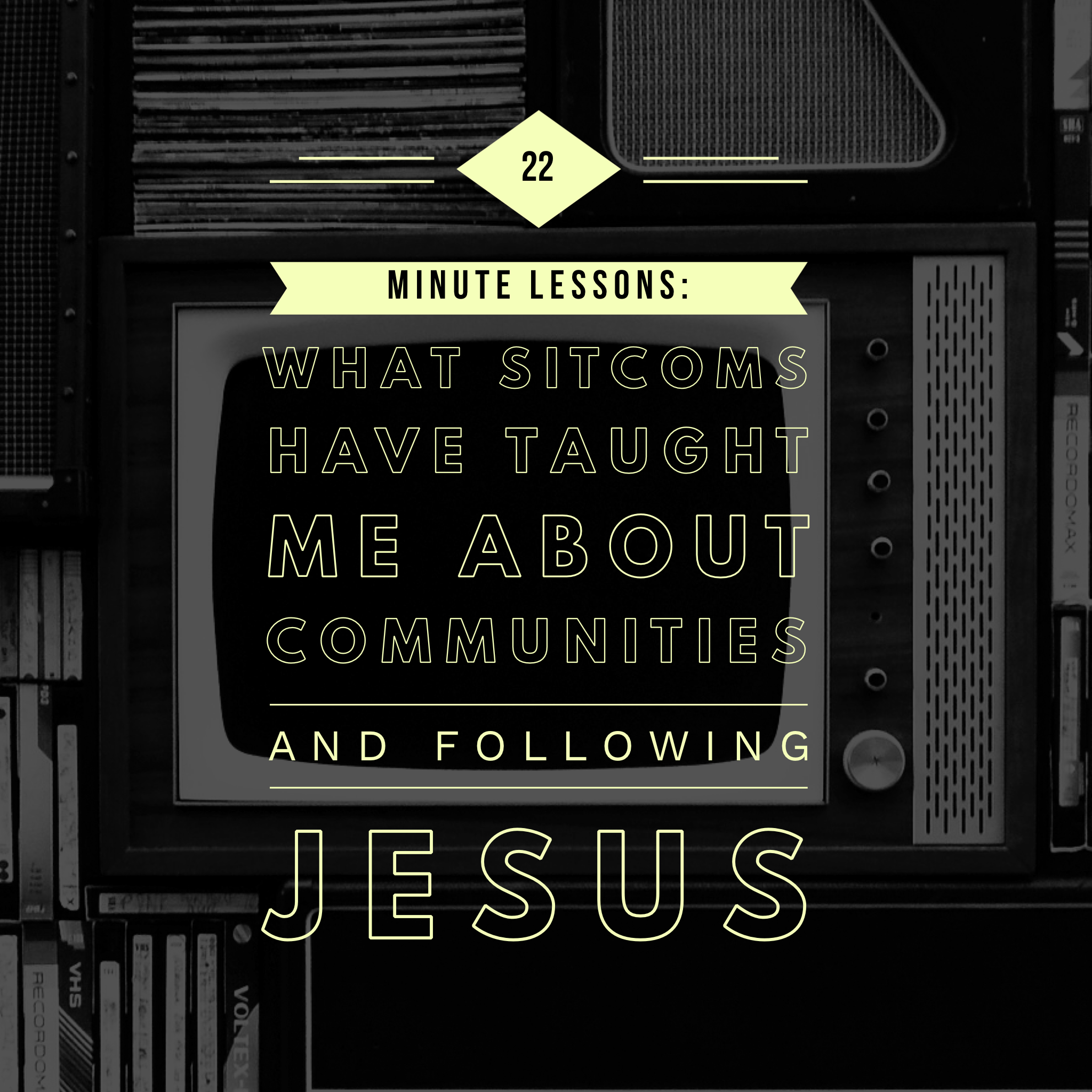22 Minute Lessons (John 13:34-35)
This is my sermon from The Bridge worship service at Woodmont Christian Church on February 4. As always, this is the manuscript so it's the gist of what I said, but not entirely what I said.
It was one of the rare beautiful days that we have had lately. The sun was shining and it was warm enough that five seniors in our youth group and I were eating lunch on the patio at SATCo. In trying to find some semblance of a theme for Youth Sunday in May, I was listening to their collective story of their time at Woodmont. Houston, Macy, Grace, Grace, and Emeline shared tales of weeklong lock-ins, read text messages that were older than one of my children, and relayed the highs and lows of their times together. I asked them why they had stayed. What made them stick around through the various changes that would have chased others away? I don’t remember who answered, but they said that they had stayed because of each other. That community, that group of friends was a safe place in a world of change, a solid rock in a churning sea.
Since the new year began, we have been doing a series called “Back to the Basics.” Our pastor has done a great job going over some of the basic building blocks of our faith. And as we wrap up that series, I want us to talk about community because it is one of the glues that hold those building blocks together. Community is the context from which most of scripture is told. The Bible is the story of a family, then tribes, then a nation, then a group of disciples, and then the early church. All of which makes sense. Community is unavoidable. You can try to do life alone, but that is nearly impossible. Relationships with other people are a fact of our reality.
Beyond that, Christian community is where many of these beliefs are put to the first tests. You can privately hold religious/spiritual beliefs and say that Jesus is important to you and pursue a life of meaning, but if it has no bearing on your relationships, then all of it doesn’t really mean anything. All of this stuff that we believe and are supposed to pursue is not simply a private endeavor. So if community is not one of the basics to which we return, we will find immense difficulty in living out any of the other basics.
There are a variety of ways in which we could talk about community since the concept is as old as human civilization. In researching this topic, I was drawn to 20th Century theologians like Dietrich Bonhoeffer and Henri Nouwen. But as I was hashing out this sermon, my wife E.A. reminded me of something: as far back as I can remember, one of the most vivid examples of community were the characters of television sitcoms. This goes back to Cheers. I remember watching episodes with my dad and thinking, “This is what the church should be like.” Which, granted, for someone raised Southern Baptist, a bar was kind of odd setting for the ideal vision of the church. It’s probably odd that I had that thought as a kid.
But Cheers was about people from all different walks of life coming together, sharing life, fighting and disagreeing with one another, but ultimately choosing to love each other. After all, sometimes we all want to go where everybody knows your name. Shouldn’t church be like that? And since sitcoms primarily deal with these concepts of community, the church can learn from the highs and lows depicted on the television screen. So Clay often mentions Karl Barth quote where one holds the Bible in one hand and the newspaper in the other. We’re going to go admittedly a little lower-brow and proceed with the Bible in one hand a TV remote in the other.
So why is Christian community essential to following Jesus? And I want to stress that we are talking about the importance of being in relationship with other Christians. This doesn’t mean that we shouldn’t have community outside the church; we definitely should. This isn’t a cult. But for our purposes today, our emphasis is why it is important for us to be together with fellow followers of Jesus and how that helps us. This is nowhere near an exhaustive list, but the opening part of a conversation that I hope you’ll continue.
So first: We are stronger together. We need to be in community with one another because it strengthens us as we prepare to face whatever the world throws our way. In 2009, a sitcom titled—appropriately for our topic today—Community debuted. The story centered around seven horribly mismatched people who gather together to form a Spanish study group at a community college and gradually become like family. Because of their wildly mismatched personalities and places in life, the study group faced a lot of conflict and had to often be rescued via an inspirational speech from disgraced ex-lawyer Jeff Winger, the group’s self-appointed leader. The show made fun of this trope, which also captures the importance of being united, in this clip from Community’s second season.
(Note: We censored the part about Harrison Ford irradiating a part of someone's anatomy in the service)
True community can be brutally hard. The TV show Community highlighted that again and again because this was a group of flawed, messed up people. Their personalities clashed constantly. Yet they found in each other a strength that they did not otherwise have. Together they could face some crazy stuff—and they faced some crazy stuff—that would have easily knocked them out alone. We are stronger together.
If there is a book of the Bible that evokes The Traveling Wilburys of Pain, it’s Ecclesiastes. The book of Wisdom Literature is this collection of sayings and ideas, many of which that deal head on with the idea that life is pain. Yet taken together the book provides insights which can help us face this sometimes cruel world.
In Ecclesiastes 4:9-12, we are reminded—like we are in Jeff Winger’s ridiculous speech montage—that we are stronger together: “Two are better than one, because they have a good reward for their toil. For if they fall, one will lift up the other; but woe to the one who is alone and falls and does not have another to help. Again, if two lie together, they keep warm; but how can one keep warm alone? And though one might prevail against another, two will withstand one. A threefold cord is not quickly broken.”
This world is going to throw the kitchen sink at you. That’s just the reality of it. And you are strong, make no mistake about that. But in a loving community that seeks to be the kind of people that God desires, you are so much stronger. In a community that seeks to love God and each other fully, a community that genuinely supports one another, that bond can stand up to much of what the world throws at us. It doesn’t insulate you from the problems of this world, but you will not be easily broken. Our community will be a supergroup that can support each other in any insane adventure that life throws our way: the Traveling Wilburys of Pain.
Christian community is also essential to following Jesus because community transforms us and every one of us needs some kind of transformation. This doesn’t mean that you are a terrible person, but there is something about being in community that—after time—can mature us into more compassionate, more giving versions of ourselves.
I’ve mentioned this before, but my favorite sitcom of all-time is Parks and Recreation. I could literally have preached this whole sermon about what the church could learn from Parks and Rec, but I figured I would mix it up. As with most long-running sitcoms, you get to watch the characters change and grow over time. Few characters on Parks and Rec changed respective to this idea of community than Ron Swanson. Without losing what makes him uniquely Ron Swanson, we watched the director of the Pawnee, Indiana Parks Department start off as…well, someone who does this…
Ron is not really about community when we first meet him. He isn’t about people being chummy. He doesn’t let people know where he lives. He tries to keep his birthday a secret. Even deep into the series, he can’t quite bring himself to call someone his friend; the best he can do is refer to them as “workplace proximity associate.” But this group of people that he feared were getting too chummy transform him to the point that by the final season of Parks and Rec, he is doing this…
He missed his friends. He missed his friends so much that he was willing to do something that he was categorically against to maintain that community. The friendship between Ron Swanson and Leslie Knope was one of the best relationships on TV. They were opposites in almost every way, yet they sharpened one another into better and more mature people. Leslie often went to Ron for wisdom or to find some sort of ethical grounding. Ron would go to Leslie to learn from her compassion and concern for other people. They changed each other just as Proverbs 27:17 reminds us: “Iron sharpens iron, and one person sharpens the wits of another.”
As Christians, we are called to be more like Jesus. We can certainly grow in that direction through prayer, personal devotional time, serving others. That ought to be part of our spiritual growth. Yet when we are in community, we witness this iron sharpening again and again. When we are around people who are genuinely joyful, we will let a little more joy into our own life. When we are around people who are wise, we tend to gain wisdom. As we are around people who love God, we tend to pursue God even more. As we are around people who are compassionate, we tend to become more compassionate.
The Fruits of the Spirit—love, joy, peace, patience, kindness, goodness, faithfulness, gentleness, and self-control—are contagious. We need to find ourselves in healthy communities to catch that, to sharpen one another, to be transformed even if it is ever so slowly.
Thirdly, Christian community is essential to following Jesus because carrying each other is one of the ways in which we become more like Jesus. You and I are people who have baggage. Some of us have done a pretty good job dealing with that baggage and some of us are better at hiding it, but we all have these burdens that we carry around with us. About 20 years ago, there was a short-lived sitcom called Sports Night. It was the show Aaron Sorkin did before he did The West Wing and I loved it.
Sports Night was set around the production of a fictional sports broadcast inspired by ESPN’s Sportscenter. It wasn’t really about sports, but about the men and women who made up the team that put this show together. That included a production assistant named Jeremy who in this scene early in the series is having a conversation with his boss Isaac Jaffe over why Jeremy ended up in the hospital while shooting an on-location piece for a hunting show for the network.
I remember watching that scene when I was 15 years old and I remember that exchange when Jeremy talks about how not fitting in is how qualified people lose their jobs. And then Isaac says that not fitting in is how they end up working there. There is so much grace in that statement. Sports Night was this place where those who were unwanted, those who felt like they didn’t fit in, those who had baggage could call home.
You can feel the weight that Jeremy is carrying in that scene. I actually had a conversation with Andra a few days ago about whether I should use that scene because Jeremy uses a mild profanity when he talks about deciding to shut the hell up. But as I thought about it, the saying is apt. Jeremy is carrying hell around inside of him. He has gone to places and doesn’t feel like he belonged and it has wounded him. So his instinct is to carry all of that hell, all of that belief that he does not belong, that he is not loved, and shove it down inside of him even if it hurts him. And Isaac tells him, “No, you’ve got to open it up. Trust us, we can share the load. The people who rejected you were idiots. They had you and they blew it.”
That is what the church should look like. It is what the church should sound like. People who don’t feel like they fit in should walk through the doors and know that they will find a home. People who are carrying burdens, who are carrying hell that they have shut up inside their bones should know that there are people here who will help carry what is weighing them down. Why? Because that is exactly what we as Christians are supposed to do.
Paul, when writing in Galatians 6:2, reminds the church of this: “Bear one another’s burdens, and in this way you will fulfill the law of Christ.” Jesus came for those that felt like they didn’t fit in, the poor in spirit, the meek, the mourning, the powerless. You watch his ministry and he gave them all a home. His followers are a bunch of men and women like Jeremy and Jesus said, “Come to me all you who are weary and are carrying heavy burdens, and I will give you rest.” And we are supposed to be like Jesus. When we enter into community, when we share our burdens with one another, and we carry them for one another then we are fulfilling the way of Christ. That is what I hope this community would look like.
We cannot do any of this by ourselves. We need community to be more like Jesus. And I recognize that community can be difficult. Your average sitcom will resolve its problem at the end of 22 minutes or, if it is a truly difficult issue, the end of a season. Life does not work that way. Problems linger. People are messed up. We don’t have Aaron Sorkin scripting inspirational speeches for us. In those moments when iron is supposed to be sharpening iron, we might accidentally cut each other up.
Is community worth it? Based on the lunch I had with those seniors last week, based on my life’s experiences, based on stories I’ve heard from others, I’m going to take a leap into faith and wager that community is worth it. Being a follower of Jesus is darn hard work. Like community, it is difficult and we need all the help that we can get in making it happen. We need each other.
And I believe that Jesus knew that. In the Gospel of John—on that night they were eating which we celebrate each week at communion—Jesus tells his followers this: “I give you a new commandment, that you love one another. Just as I have loved you, you also should love one another. By this everyone will know that you are my disciples, if you have love for one another.” As the song says, they will know we are Christians by our love. May that be what we are known for.






